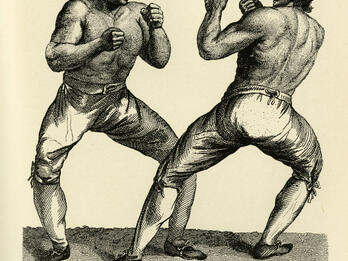The Education of the Heart
Warrenton, North Carolina
U.S. of America
August 7th, 1815
A young American lady who has long felt towards Miss Edgeworth those sentiments of respect and admiration which superior talents exerted in the cause of virtue and morality never fail to excite. [ . . . ]
With all my confidence in the benignant goodness of Miss Edgeworth I tremble at having said so much, and trespassed so very greatly on her patience and indulgence; still must I entreat that they may be extended to me yet a little longer.
Relying on the good sense and candour of Miss Edgeworth I would ask, how it can be that she, who on all other subjects shows such justice and liberality, should on one alone appear biased by prejudice; should even instill that prejudice into the minds of youth! Can my allusion be mistaken? It is to the species of character which wherever a Jew is introduced is invariably attached to him. Can it be believed that this race of men are by nature mean, avaricious, and unprincipled? Forbid it, mercy. Yet this is more than insinuated by the stigma usually affixed to the name. In those parts of the world where these people are oppressed and made continually the subject of scorn and derision, they may in many instances deserve censure; but in this happy country, where religious distinctions are scarcely known, where character and talents are all sufficient to attain advancement, we find the Jews to form a respectable part of the community. They are in most instances liberally educated, many following the honourable professions of the Law, and Physick, with credit and ability, and associating with the best society our country affords. The penetration of Miss Edgeworth has already conjectured that it is a Jewess who addresses her; it is so, but one who thinks she does not flatter herself in believing that were she not, her opinion on this subject would be exactly what it is now. Living in a small village, her father’s the only family of Israelites who reside in or near it, all her juvenile friendships and attachments have been formed with those of persuasions different from her own; yet each has looked upon the variations of the other as things of course—differences which take place in every society. Again and again I beg pardon for thus intruding myself on Miss Edgeworth’s notice; yet even now is my temerity about to appear in a new form while I give utterance to a very imperfect hope, that these lines may be honoured with a reply, and their author thus taught to believe herself not wholly unpardonable, in the liberty she takes in writing them. Should she be thus highly favoured, Miss Edgeworth will have the goodness to direct the letter according to the address, which a brother of the writer’s, now in England, will annex.
With sentiments of admiration, esteem, and gratitude, Miss Edgeworth’s
most respectful and obedient servant
Rachel Mordecai
Credits
Published in: The Posen Library of Jewish Culture and Civilization, vol. 6.



